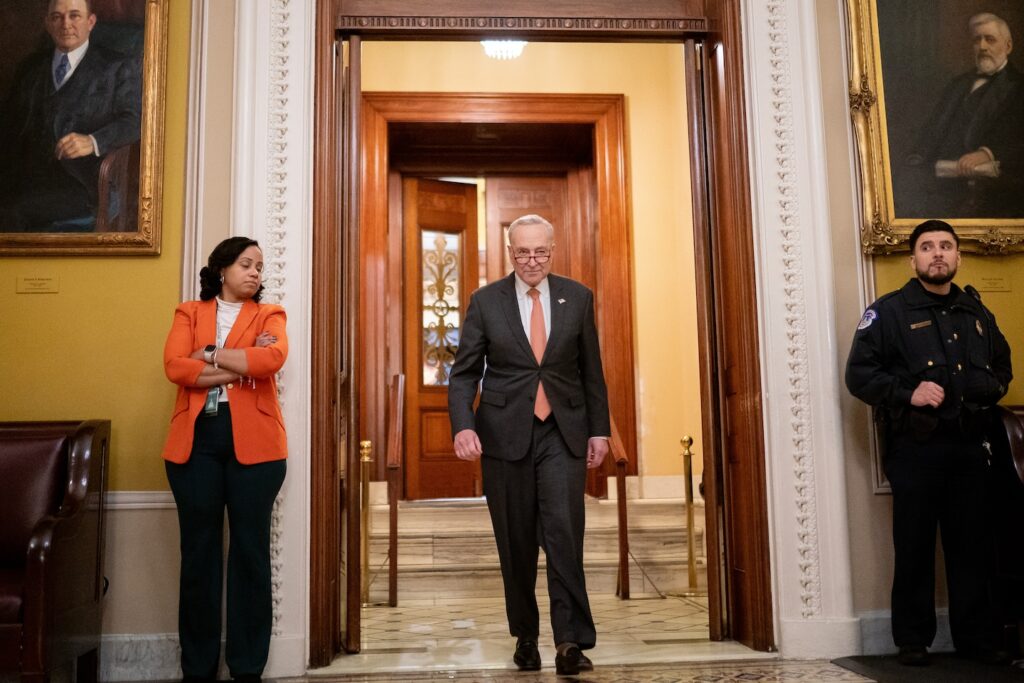Although the passage came past the 12:01 a.m. deadline, meaning some federal funds have technically expired, the White House Budget Office said a vote was imminent and Biden expected to pass the bill later Saturday. He said he would not declare closure because he plans to sign the
The House passed the bill Friday morning, the result of an agreement between Mr. Biden and House Speaker Mike Johnson (R-Louisiana) and Senate Majority Leader Charles E. Schumer (R-New York).
But the vote there was a surprisingly narrow success for Mr. Johnson and the House Republican leadership, sparking a revolt by far-right extremists in the chamber and testing the speaker's tenuous grip on the chamber.
This foreshadowed an upheaval in the Senate throughout the day and night. A group of Republican senators called for votes on amendments to the bill on politically sensitive issues such as immigration, sanctions on Iran and government spending. But changing the bill in any way would have ensured closure. The bill needed to be approved again by the House of Representatives, which was already in recess, with plans to adjourn for more than two weeks.
The Senate remained in session until early Saturday morning, with Schumer and Republicans haggling over the deal. A deal was reached just before the deadline, allowing exhausted lawmakers to finally vote.
“I'm going to be brief, because I want to move quickly to a vote,” Schumer said just before the Senate began a series of more than a dozen votes that began around midnight. “It has been a very long and difficult day, but we have now reached an agreement to complete funding for the government.”
Even if the funding suspension had lasted until Saturday or Sunday, its impact would likely have been muted. In any case, many federal employees in unfunded government agencies will have weekends off.
Sen. Jerry Moran (R-Kansas) told the Washington Post, “I'm against shutdowns, but a weekend-only shutdown is the best possible version of any kind of shutdown.” Told. “What hurts in this is the defense.”
Negotiators took so long to work out the final details of the package, the House took so long to vote on a deal that the Senate — by its slow standards — had to wait until midnight. There was little time to pass the bill.
Republican Sens. Ted Budd (North Carolina), Mike Lee (Utah), Ted Cruz (Texas), and Rand Paul (Kentucky) are ceding time to allow the vote to proceed. He requested a vote on the amendment before agreeing to it.
This sparked not only a policy debate in the Senate, but also a personal controversy. Sen. Susan Collins of Maine, the top Republican spending official, had to return to her home state Saturday morning for her mother's funeral. Her Senate leadership tried to eliminate or expedite the processing of her amendment as a courtesy to her so that she could vote on it before leaving Washington.
The Senate can act quickly with unanimous consent, so if all 100 members had agreed, the 12 hours the House had to leave the Senate to process the bill might have been enough. They didn't until minutes before the deadline.
“This is beyond stupid,” said Sen. Chris Coons (D-Delaware), a close friend of Collins and a key interlocutor with Schumer. “This is mean.”
The bill marks the end of a months-long scramble to fund the federal government for fiscal year 2024, which began on October 1, 2023. Congress passed several temporary spending extensions last fall and early this year, and ultimately approved full-year spending. Two weeks ago, it was about a quarter of the government's share. Each spending bill was supported by more Democrats than Republicans in the House.
Finishing the last three quarters was the hardest part. Republicans at the negotiating table with White House officials were able to turn funding provisions for the Department of Homeland Security into a broader fight over immigration policy.
The bill would increase funding for Immigration and Customs Enforcement to support about 42,000 detention facility beds and provide funding for 22,000 Border Patrol agents. It would also reduce U.S. contributions to non-governmental organizations that provide services to new arrivals by 20%. Lawmakers who want to restrict immigration argue that nonprofit groups encourage illegal immigration.
Republicans could also block federal funding for the United Nations Relief and Works Agency for Palestine Refugees in the Near East (UNRWA) for the next 12 months. Israel has accused some of its personnel of involvement in an October 7 attack on Israel by the Hamas militant group that killed about 1,200 people and took hundreds more hostage in the Gaza Strip. A US intelligence assessment reportedly verified some of Israel's claims regarding UNRWA.
The bill also includes a 6% cut in foreign aid programs, which are already a small portion of federal spending, and a Republican change to a law that bans unofficial flags from being flown at U.S. embassies. Republican lawmakers want to use a slightly narrower version of a long-standing rule to prevent Biden appointees from displaying Pride flags in public at U.S. diplomatic locations. thinking.
Democrats removed other policy provisions that would restrict access to abortion and limit the rights of LGBTQ Americans.
Certain Democratic priorities have also seen significant funding increases, such as adding $1 billion to Head Start early education programs and $1 billion to fund the Department of Defense's climate resiliency. Ta. The bill also provides 12,000 additional special immigrant visas for Afghans who support U.S. forces and attempt to flee the Taliban government.


